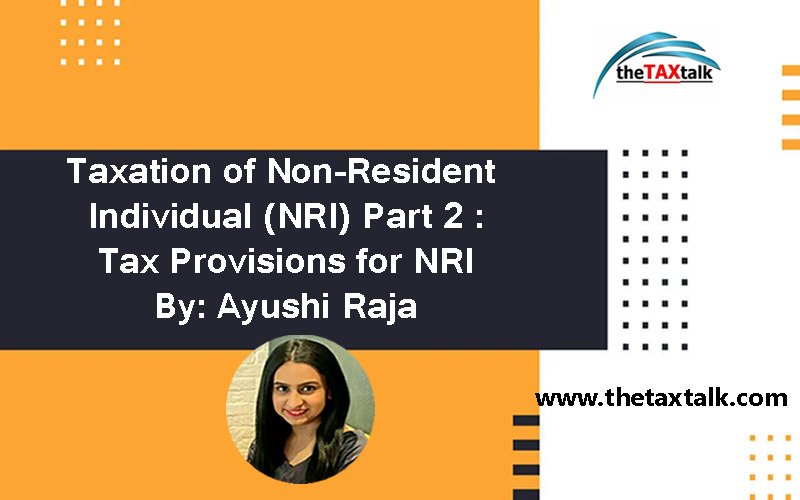![]()
Taxation of Non-Resident Individual (NRI) Part 2 :Tax Provisions for NRI
By: Ayushi Raja
(The author is an article assistant at SSRPN & Co. She can be approached at cassrpn@gmail.com)
In the previous article we discussed briefly the meaning, concept and basis for determination of Residential status. The link for the same has been provided hereby.
https://thetaxtalk.com/2022/03/01/taxation-of-non-resident-a/
Now, in this article we shall understand the tax provisions where the income of a Non Resident is taxable.
NRI Taxation Rules:
Rules for Taxation in India for a NRI are very different from that of a normal Resident of India. Some important points to be noted are as under:
-
The Tax slabs for a NRI depends on his/her total income, and not upon their age, gender or any other factor.
-
No rebate under Section 87A shall be allowed to NRI’s.
-
In case of TDS, all incomes of NRIs are charged irrespective of any threshold value.
-
No nominal deductions are applicable on investment income except under some specific situations.
-
Tax filing isn’t normally required for NRIs if the income is subject to clauses under Section 115G of the Income Tax Act.
Tax Exemptions for NRIs:
The incomes that are exempted from tax are as follows –
-
Interest earned on Non Resident External (NRE)/ Foreign Currency Non Resident Bank Account (FCNR) accounts.
-
Interest earned on savings certificates and notified bonds issued by government.
-
Dividend income earned from shares of domestic Indian companies.
-
Long term capital gains from listed equity shares and equity-oriented mutual funds.
-
Capital gains can be exempted through the sections and conditions as-
-
Section 54 – In case a house property is held for 3 or more years is sold and the proceeds or part thereof are used to purchase another property or deposited in a PSU or other banks as per the Capital Gains Account Scheme of 1988.
-
Section 54F – In case any property other than a house is sold and capital gains are incurred, this exemption can be claimed on the construction or purchase of a new house in proportion to how much of the sale proceeds have been spent on the new asset.
-
For detailed explanation of Section 54F, refer the link given below.
https://thetaxtalk.com/2022/02/25/a-capital-asset/
-
Section 54EC – If long term capital gains are invested in bonds like the ones issued by the National Highway Authority of India and Rural Electrification Corporation. These have a redemption value after 3 years and shouldn’t be sold before that. In such cases, as per the budget of 2014, a maximum of INR 50 lakhs can be invested in a financial year.

